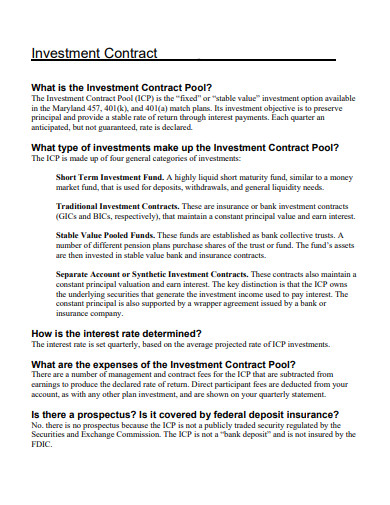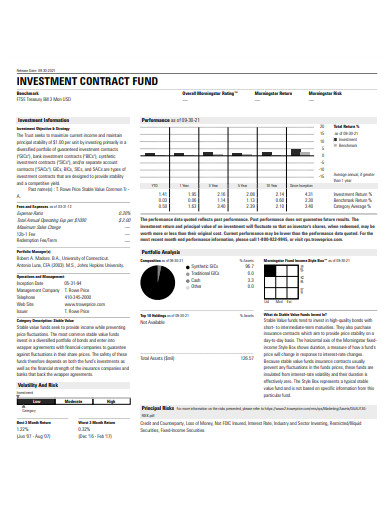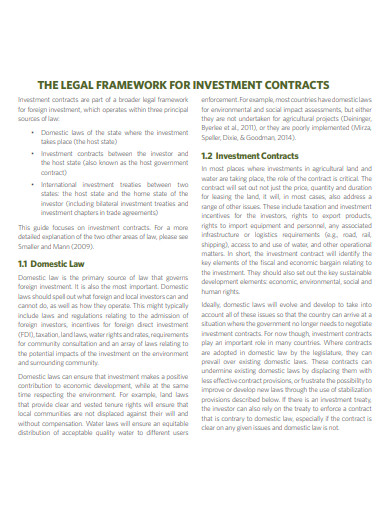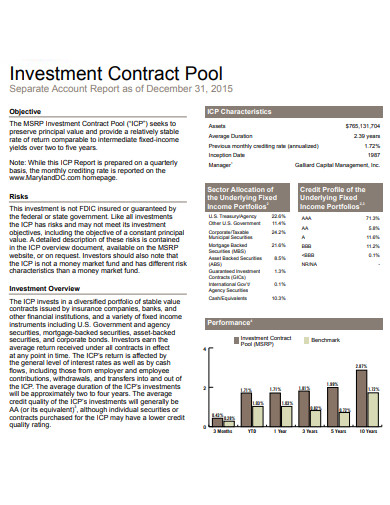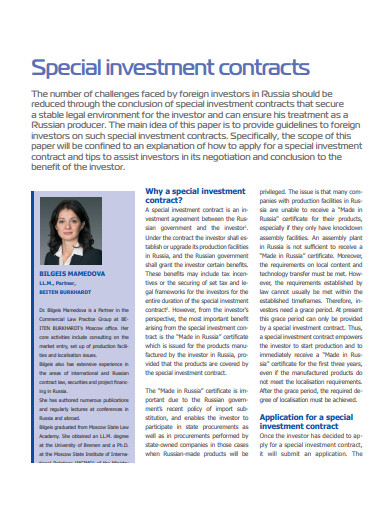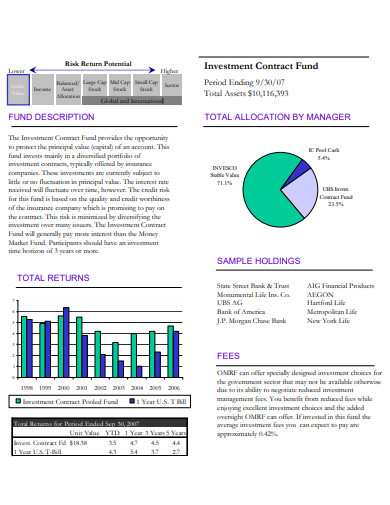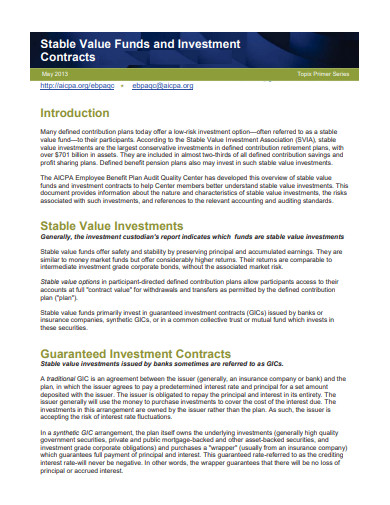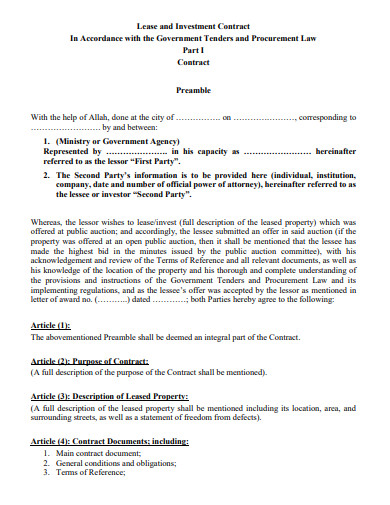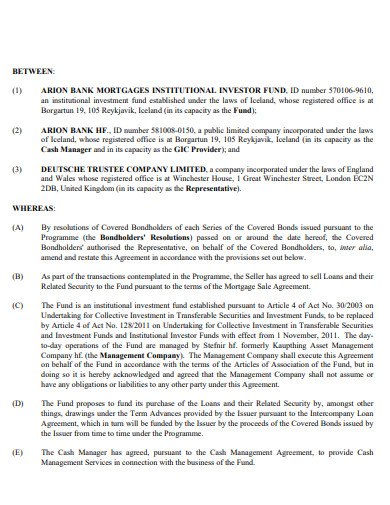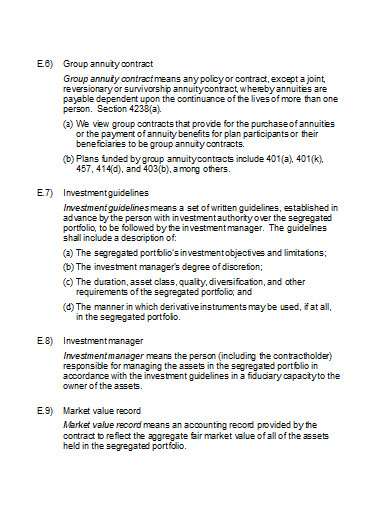In macroeconomics, investment is not at all like saving. You are saving, not investing, if you are not purchasing a capital asset that generates income, such as a machine, or with the expectation that it will appreciate in value, such as a house. When a company acquires equipment with part of its financial gain and puts the rest in a savings account, you can save more than you invest. You can, on the other hand, invest more than you save. When it comes to financing the purchase of a home, which is a capital asset, many people invest more than they save.
10+ Private Investment Contract Samples
In macroeconomic terms, private investment is the purchase of a capital asset that is expected to generate income, increase in value, or both generate income and increase in value. A capital asset is simply property that is difficult to sell and is typically purchased to assist an investor in making a profit. Land, buildings, machinery, and equipment are examples of capital assets.
1. Private Investment Contract
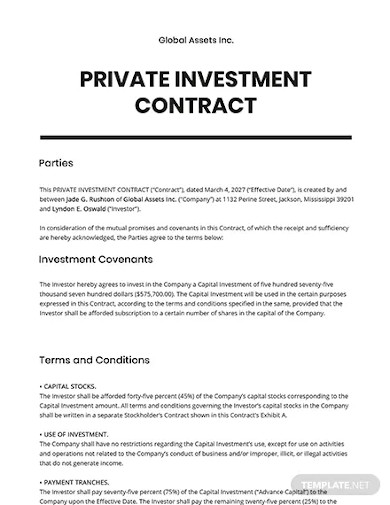
2. Sample Private Investment Contract
3. Private Investment Fund Contract
4. Private Legal Investment Contract
5. Private Investment Contract Pool
6. Private Special Investment Contract
7. Private Investment Contract Fund
8. Simple Private Investment Contract
9. Private Lease and Investment Contract
10. Private Investment Contract Example
11. Printable Private Investment Contract
Private Equity
Private equity (PE) is a type of financing in which money (capital) is put into a business. PE investments are typically made in mature industries in traditional sectors in exchange for equity, or a share of ownership. PE is a major subset of the private markets, a larger and more complex segment of the financial landscape.
Private equity, like real estate, venture capital, distressed securities, and other alternative asset classes, is a type of investment. Alternative asset classes are deemed less traditional equity investments, which implies they are not as accessible in the public markets as stocks and bonds. In this in-depth look at the public and private sectors, you’ll learn more about the differences between the two.
Private equity investors are investors who work for a private equity firm. They’re essential for both raising capital and identifying companies that will make good investments. In 2017, there were 3,953 active private equity investors, up 51% from 2007.
Private Investment on Public Equity
Reverse mergers are frequently financed using private investment in public equities (PIPEs). A PIPE is a stock exchange investment in a publicly-traded company. Even though the investment is in a public company, it still falls under the category of private equity because the profit mechanism is unrelated to the stock exchange. The goal of private equity is to achieve capital gains and returns through the private equity market rather than the stock exchange. The goal of the operation is not to trade the security in the short term, but to purchase a minority stake (usually at a lower price than the market price) and sell it to another potential investor at a price that is not based on stock exchange benchmarks.
This stake must be large enough for the final purchaser to become the majority shareholder. To make this deal work, the private equity investor must understand the bare minimum of ownership required to become the company’s owner. As a result, these transactions may be hostile, i.e., they may take place without the consent of the original owner.
FAQs
What is a private equity firm?
An investment firm that specializes in private equity is known as a private equity firm. They invest in companies with the intention of increasing their value over time before selling them for a profit. PE firms, like venture capital (VC) firms, invest in promising private companies using capital raised from limited partners (LPs).
What is a private equity fund?
To invest in a company, private equity investors form a fund—also known as a private equity fund—by pooling capital from limited partners. They close the fund once they’ve met their fundraising goal and put the money into promising businesses.
How does private equity work?
To make an investment, private equity investors form funds by pooling funds from limited partners. They close the fund once they’ve met their fundraising goal and put the money into promising businesses. PE investors may invest in a company that is stagnant or in danger of going bankrupt but still has growth potential. The most common deal type is a leveraged buyout or LBO. Although the setup of investments can vary, the most prevalent deal type is a leveraged buyout or LBO. In a leveraged buyout, an investor buys a controlling stake in a company with a combination of equity and a large amount of debt that the company must eventually repay. In the meantime, the investor strives to increase profitability so that debt repayment is less taxing.
At this point, you’re probably seeing a strong link between investment and savings. Savings accounts provide the funds needed to make investments and determine the cost of borrowing to invest. The cost of borrowing can be thought of as the interest rate you must pay on borrowed funds.
Related Posts
Sample Excuse Letter for School
Feature Writing Samples
FREE 10+ Security Guard Contract Samples in PDF | MS Word
FREE 10+ Option to Purchase Agreement Samples in MS Word | Apple Pages | PDF
FREE 26+ Curriculum Form Samples in MS Word | PDF
FREE 20+ Cleaning Service Proposal Samples in PDF | MS Word
FREE 29+ Sample Loan Application Form Templates in MS Word | PDF
FREE 10+ Event Venue Contract Samples in PDF | MS Word | Pages | Google Docs
FREE 10+ SBAR Samples in PDF | DOC
FREE 12+ Music Band Contract Templates in PDF | MS Word
FREE 10+ HVAC Maintenance Contract Samples in PDF | MS Word
FREE 10+ Social Media Marketing Contract Samples in MS Word | PDF
FREE 10+ Wholesale Assignment Contract Samples in PDF
FREE 18+ Financial Proposal Samples in PDF | MS Word | Google Docs | Pages
FREE 10+ Feasibility Study Samples in PDF

